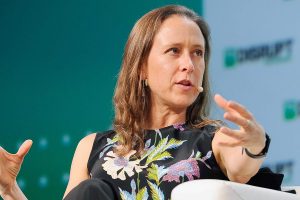23andMe is going public. We spoke with its CEO about its road to IPO, and what the future holds for the consumer genetics industry.

- 23andMe intends to go public in a reverse merger with Richard Branson’s blank-check holding company.
- CEO Anne Wojcicki told Insider the pandemic reinvigorated the consumer-genetics industry.
- Wojcicki said she would not have considered going public through a SPAC six months ago.
- Visit the Business section of Insider for more stories.
Digital health’s SPAC party is just getting started.
23andMe, the 14-year-old consumer genetic-testing company, entered to the fray Thursday when it announced its intention to merge with Richard Branson’s blank-check holding company VG Acquisition. The deal would value 23andMe at $3.5 billion.
Cofounder and CEO Anne Wojcicki and Branson will each contribute $25 million to VG Acquisition. The fund is expected to raise $759 million through a combination of public and private investors to finance the merger and bring 23andMe public.
It’s the second-biggest healthcare special-purpose acquisition company deal to date. Only Clover’s SPAC, which valued the insurance startup at $3.7 billion and included $1.2 billion in funding from the investor Chamath Palihapitiya’s Social Capital Hedosophia Holdings, was larger.
Wojcicki told Insider she wouldn’t have considered going public via a SPAC even six months ago, shortly before Clover’s headline-grabbing debut. She said she reconsidered when she learned of Branson’s involvement.
“I know who your shareholders are matters,” Wojcicki said, adding that “one of the No. 1 pieces of advice I give to founders and startups is that you have to pick your investors wisely.”
The deal is happening after a turbulent few years in the consumer-genetics industry as interest hit a “lull,” but it recovered amid the pandemic.
A different avenue to the public markets
The companies haven’t disclosed how much of 23andMe Branson’s SPAC will own after the merger, but the nature of SPAC deals would indicate his regular involvement with the company once the deal is finalized. Partnering with Branson, instead of bringing him on as an investor in a traditional initial public offering, appealed to Wojcicki because of his alignment with the healthcare business’ growth goals, she said.
“I was quite convincing, even to myself, that we were not going to go public for a while,” she said.
Wojcicki said her primary motivation for taking the company public was the better access to funding that comes with public-market investors. It raised $85 million in private funding from its existing investors Sequoia Capital and NewView Capital as recently as December 23.
“That was before, obviously, the SPAC was finalized,” Wojcicki said of the decision to raise private funding so close to the SPAC announcement. “It was an insider round, and our investors were really supportive of what we’re doing. And having additional cash is always helpful.”
Consumer genetics testing is rebounding
Funding is particularly appealing, both in private and public markets, now that the consumer genetics testing market is recovering from a yearslong slump, Wojcicki said.
The slowdown in the market led companies like 23andMe and its rival Ancestry to go through rounds of layoffs. Consumer genetics tests raised concerns around ethics and privacy, along with a slew of tough questions about identity and family.
Wojcicki said she was prepared for the cooldown to continue when the coronavirus pandemic hit the US economy.
“We definitely went into the year eyes wide open and thinking that it was going to be awful,” Wojcicki said.
One of its core investors, Sequoia, wrote a note on March 5 calling the coronavirus the “black swan of 2020,” a term referring to an event that can have catastrophic consequences on the market.
With so much uncertainty, 23andMe stayed conservative with marketing its tests and clamped down the business, Wojcicki said.
But then, she said, the demand was higher than the company expected.
In an investor presentation Thursday, 23andMe said it had 9.8 million cumulative genotyped customers by the end of fiscal year 2020, up from 7.8 million cumulative customers the prior fiscal year.
The focus on underlying conditions in relation to the coronavirus pandemic has increased people’s awareness of genetic testing and prompted a resurgence of interest in the space, she said.
23andMe has worked on coronavirus-related research as well. In September, 23andMe published the preprint results of a genetic study it conducted that found a link between a person’s genetic code, how likely they were to contract COVID-19, and the severity of the disease if they did get it.
The peer-reviewed results will be released later this year, Wojcicki said. She emphasized that it was important for her to focus on what 23andMe did well when evaluating the company’s role in responding to the pandemic, and a study of genetics aligned better than developing coronavirus tests.
Source: Read Full Article
